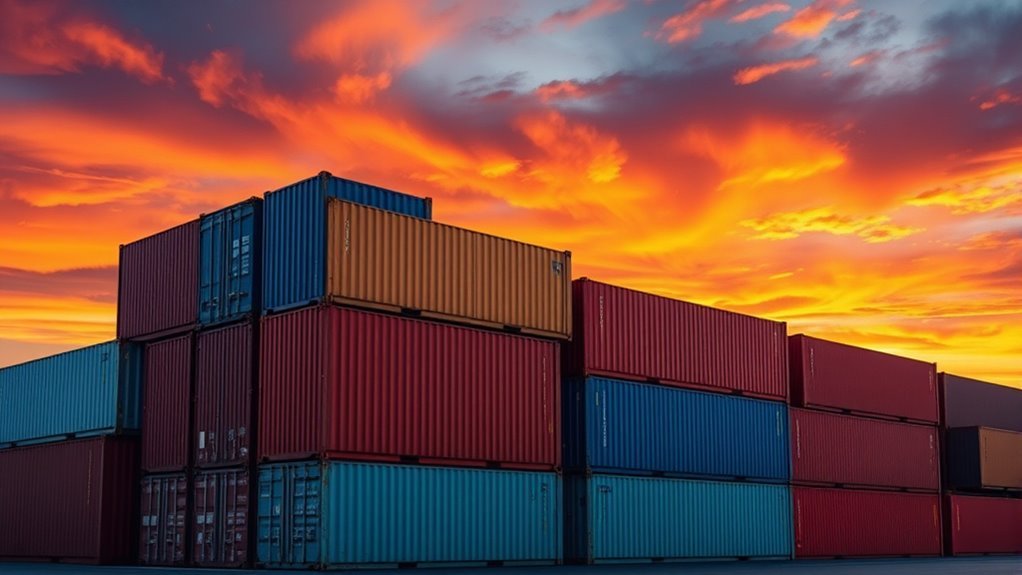Mozambique offers fertile ground for financial success, especially in agriculture, tourism, and logistics. The growing population and resource wealth fuel numerous opportunities. However, entrepreneurs face bureaucratic hurdles and infrastructure limitations. Securing capital requires a strategic approach, leveraging microfinance, government programs, and FDI. Success hinges on building strong local relationships and adapting to cultural nuances. Discovering more can unveil the potential for a prosperous journey ahead.
Main Points
- Explore agriculture (cashews, sugar, cotton, tea) for export opportunities.
- Capitalize on tourism growth by offering unique experiences.
- Navigate bureaucracy strategically with local partnerships.
- Address infrastructure gaps with energy or transportation solutions.
- Seek funding through DFIs/government programs that support emerging businesses.
Promising Industries in Mozambique
Mozambique’s diverse economy presents various opportunities for investors and entrepreneurs. Natural resources, bolstered by discoveries of natural gas and coal, fuel significant economic activity.
Agriculture remains essential, employing a large portion of the population. Cashews, sugar, cotton, and tea are key exports. The fishing industry also provides income and sustenance.
Tourism continues to grow, attracting visitors to Mozambique’s coastline and national parks.
Investments in hotels, resorts, and related infrastructure are expanding. Infrastructure development, including roads, ports, and energy projects, provides further opportunities. Real estate is also a growing market, driven by urbanization and economic expansion.
Starting a Business: Opportunities and Challenges

For entrepreneurs, Mozambique offers fertile ground, albeit with inherent obstacles. Opportunities abound in agriculture, tourism, and logistics, fueled by a growing population and resource wealth.
However, navigating the business landscape presents challenges. Bureaucracy can be extensive, requiring patience and local expertise.
Infrastructure limitations, particularly reliable electricity and transportation networks, pose operational hurdles. Skilled labor shortages exist, necessitating investment in training. Cultural nuances and language barriers require sensitivity and adaptation. Corruption, although addressed by the government, remains a concern. Addressing these challenges strategically is crucial for business success.
Investment and Funding Options
Successfully addressing challenges allows entrepreneurs to consider investment and funding options. Securing capital in Mozambique requires a strategic approach.
Microfinance institutions offer smaller loans suitable for startups and small businesses.
Commercial banks provide larger loans, but often demand significant collateral and a proven track record.
Government programs and development finance institutions offer targeted funding for specific sectors.
Foreign direct investment (FDI) is a crucial source of capital, particularly in sectors like energy and agriculture.
Private equity firms are increasingly active, seeking high-growth potential businesses.
Angel investors and venture capitalists may provide seed funding for innovative startups.
Navigating the Mozambican Market
Entering the Mozambican market involves understanding its unique characteristics. This includes a blend of traditional practices and growing modernization. Building strong relationships with local partners is crucial for success.
Navigating bureaucracy requires patience and expert local assistance.
Understanding the legal and regulatory framework is essential to avoid pitfalls. Market research is vital to identify unmet needs and target specific demographics.
Consider cultural nuances in business interactions, such as prioritizing personal connections.
Adapt business strategies to align with local customs and preferences. Tailoring products and services to the local market increases acceptance and revenue potential.
Common Questions
What’s the Average Salary in Mozambique?
The average salary in Mozambique varies significantly. Factors such as education, experience, and industry heavily influence earnings. Generally, average incomes might fall within a broad range, but accurate, up-to-date figures require consulting reliable sources due to economic fluctuations.
How Safe Is Mozambique for Foreigners?
Mozambique’s safety for foreigners varies. Urban areas face petty crime risks. The northern region has seen insurgent activity, requiring caution. Travelers should research current conditions. Vigilance and awareness are advised, ensuring a safer visit.
What Are the Visa Requirements for Entrepreneurs?
Entrepreneurial visas in Mozambique require a detailed business plan. Proof of sufficient investment capital is necessary. Applicants must register their company. Expect scrutiny regarding job creation and skills transfer plans. Processing times vary.
What Is the Cost of Living in Mozambique?
Cost of living in Mozambique varies. Expenses depend on location and lifestyle. Maputo is pricier than rural areas. Accommodation, food, and transportation costs factor in. Expats may find costs moderate but should budget wisely based on their specific needs.
Where Can I Find Reliable Local Partners?
Finding reliable local partners involves networking at industry events and joining business associations. Trade missions and commercial sections of embassies can offer contacts. Diligence is required when vetting potential partners.